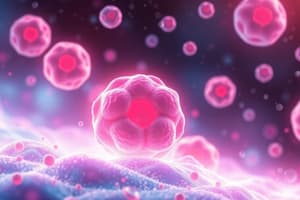Podcast
Questions and Answers
What is the most common type of cell infected in viral infections?
What is the most common type of cell infected in viral infections?
- Lymphocyte
- Neutrophil
- Basophil
- Eosinophil (correct)
Which type of infection is associated with eosinophil cells?
Which type of infection is associated with eosinophil cells?
- Parasitic infection
- Bacterial infection
- Viral infection (correct)
- Fungal infection
What is the commonly infected cell type in air?
What is the commonly infected cell type in air?
- Lymphocyte
- Macrophage
- Eosinophil (correct)
- Monocyte
Which of the following is NOT true about eosinophil cells?
Which of the following is NOT true about eosinophil cells?
What is the relationship between eosinophils and viral infections?
What is the relationship between eosinophils and viral infections?
What is the consequence of partial obstruction in the lung?
What is the consequence of partial obstruction in the lung?
What type of emphysema occurs following the removal of a lobe of a lung?
What type of emphysema occurs following the removal of a lobe of a lung?
What is the result of scarring or abscess in the lung?
What is the result of scarring or abscess in the lung?
What is recoil in the context of lung physiology?
What is recoil in the context of lung physiology?
What is the term for the expansion of lung tissue following the removal of a lobe?
What is the term for the expansion of lung tissue following the removal of a lobe?
What is believed to be the result of virus-induced inflammation of the respiratory mucosa?
What is believed to be the result of virus-induced inflammation of the respiratory mucosa?
What part of the respiratory system is affected by virus-induced inflammation?
What part of the respiratory system is affected by virus-induced inflammation?
What is the consequence of emphysema in the lung?
What is the consequence of emphysema in the lung?
What is the location of the vagal receptors affected by virus-induced inflammation?
What is the location of the vagal receptors affected by virus-induced inflammation?
What is the effect of virus-induced inflammation on the threshold of vagal receptors?
What is the effect of virus-induced inflammation on the threshold of vagal receptors?
What is the suspected relationship between virus-induced inflammation and irritants?
What is the suspected relationship between virus-induced inflammation and irritants?
What is a characteristic of emphysema with no bronchitis component?
What is a characteristic of emphysema with no bronchitis component?
What is a symptom of chronic bronchitis?
What is a symptom of chronic bronchitis?
What is a consequence of chronic bronchitis?
What is a consequence of chronic bronchitis?
What is a characteristic of patients with chronic bronchitis?
What is a characteristic of patients with chronic bronchitis?
What is a consequence of retaining CO2 in chronic bronchitis?
What is a consequence of retaining CO2 in chronic bronchitis?
What will occur in the body due to hypoxemia?
What will occur in the body due to hypoxemia?
What is the main difference between patients with pure emphysema and emphysema with bronchitis component?
What is the main difference between patients with pure emphysema and emphysema with bronchitis component?
What will occur as a result of pulmonary hypertension?
What will occur as a result of pulmonary hypertension?
What will happen to patients with pure emphysema when they develop a new pathology like chronic bronchitis?
What will happen to patients with pure emphysema when they develop a new pathology like chronic bronchitis?
Which type of emphysema is characterized by hypercarbic drive and hyperventilation?
Which type of emphysema is characterized by hypercarbic drive and hyperventilation?
Flashcards are hidden until you start studying
Study Notes
Viral Infection and Eosinophils
- Eosinophils are the most common cell type in viral infections of the respiratory mucosa.
- Viral infection is thought to lower the threshold of subepithelial vagal receptors to irritants.
Partial Obstruction and Hyperinflation
- Partial obstruction can lead to hyperinflation, which is different from emphysema.
- Emphysema is a destruction of the lung tissue, whereas hyperinflation is not.
Types of Emphysema
- Compensatory emphysema: occurs when a lobe of the lung is removed, and the other lobes expand to compensate.
- Irregular or tractional emphysema: occurs due to scarring, abscess, or other lung damage.
Emphysema Characteristics
- Reduced FEV1 with normal or near normal FVC.
- Insidious, but steadily progressive dyspnea, which may combine with other pathologies in patients with COPD.
Emphysema vs. Chronic Bronchitis
- Emphysema: characterized by hypercarbic drive and hyperventilation.
- Chronic bronchitis: characterized by productive cough, less prominent dyspnea, and less respiratory drive.
- Chronic bronchitis patients retain CO2, have no gas exchange, and may develop respiratory acidosis.
Clinical Consequences
- Hypoxemia can lead to blood vessel spasm, pulmonary hypertension, and cor pulmonale.
- Right ventricular hypertrophy and RHF can occur due to hypoxemia.
- Blue bloaters: patients with chronic bronchitis who become cyanotic due to loss of hypercarbic drive.
Studying That Suits You
Use AI to generate personalized quizzes and flashcards to suit your learning preferences.




